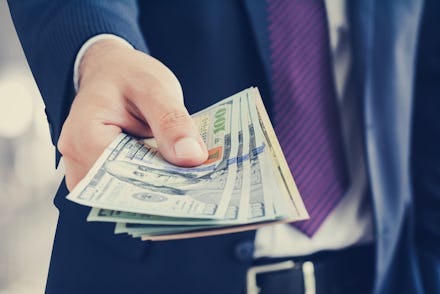What to do with your tax refund: Here's the best way to use that check from the IRS.

If you're like the majority of Americans receiving a tax refund this year, you'll probably be doing battle with the angel on your shoulder telling you to save the refund and the devil telling you to spend it on that cooler you saw on Kickstarter. Financial experts say: listen to the angel.
With individual tax refunds averaging $3,000, that's a pretty big chunk of change. And among millennials, 39% plan to save or invest their refund, 28% plan to use it to pay for necessities and 24% say they'll use it to pay down debt, according to a 2017 Bankrate Money Pulse survey.
"While its tempting to splurge when you receive your refund, we found millennials are more likely to save it, which shows they are making an investment in their future self," Bankrate's Sarah Berger told Mic by phone.
Here are 5 ways you can make your tax refund dollar work for you:
1. If you have debt, try the "avalanche"
Now is the perfect time to blitz high-interest loans using the "avalanche" method, which involves tackling your highest-interest debt first.
Why is it more beneficial to pay down high-interest debt versus parking your refund in a savings account? If you have $10,000 in savings earning 0%, but $10,000 in credit card debt with a 10% rate, your net worth is zero, Bankrate explained. Your net worth shrinks further as interest on debt increases, so paying that $10,000 debt with your $10,000 savings allows your net worth to stabilize and hopefully grow.
2. Treat yourself (a little) — then save the rest
You don't have to be a total party pooper with your refund. "Consider spending a small portion of it on something fun and then save the rest," Berger suggested. That way you can treat yourself today and tomorrow.
If you mark the occasion with a special treat, you'll not only appreciate it more, you'll feel more inspired to save the rest, according to Forbes. The simple act of partaking in one special luxury will leave you satisfied and encourage you to squirrel the rest away.
A great place to keep the remainder of the refund is in a designated emergency fund, if you don't already have one or it isn't fully funded. "Everyone should have four to six months of expenses covered in an emergency fund," Berger said. "My recommendation is to choose a high-yield savings account." (Here are some suggestions.)
3. Beef up your retirement savings
Already got enough money stashed away in your emergency fund? The next-best place to park your refund is in a tax-advantaged retirement account like a traditional or Roth IRA. Traditional IRAs reduce your taxable income for the current year, while Roth IRAs let you withdraw money in the future without paying taxes on the earnings.
You can contribute up to $5,500 a year in a traditional IRA if you are under 50. However, if you are also covered by a retirement plan at work, you can only deduct the full amount on your taxes if you earned $61,000 or less in 2016 or $62,000 or less in 2017.
(Don't have an IRA? Here's how to open one.)
4. Start a dream account
Fund your bucket list with tax refund money so taking that trip of a lifetime or new home or car purchase is closer to being a reality. As with an emergency account, NerdWallet suggests a high-yield savings account to build your fund. Also, create a special account for this fund instead of keeping it your everyday checking or emergency fund account. This will make it harder to spend and motivate you to save even more.
5. Play the "refund" lottery to win up to $25,000
If you need a little more motivation to save your refund, consider entering the Save Your Refund lottery, sponsored by the non-profits Commonwealth and America Saves. To enter, you are encouraged to "split" your refund by directing at least $50 into a qualified savings account (such as a a U.S. Savings Bond, a certificate of deposit, IRA or 529 educational savings account), then do whatever you want with the rest.
There are two different prizes: a $100 weekly drawing and a $25,000 grand prize, which will be announced in May. Be sure to read the fine print here, and enter by the April 18 deadline.
Too late for the refund lottery? You can enter other prize-linked savings accounts offered by credit unions and apps like the Long Game any time of the year. The accounts are FDIC insured, so you get all the excitement of playing the lottery without ever worrying about losing your shirt.
Sign up for The Payoff —your weekly crash course on how to live your best financial life. Additionally, for all your burning money questions, check out Mic's credit, savings, career, investing and healthcare hubs for more information —that pays off.